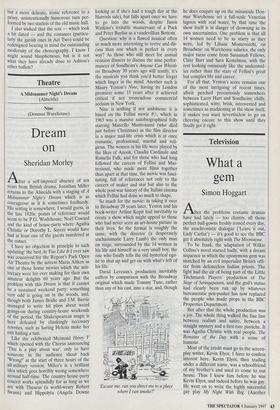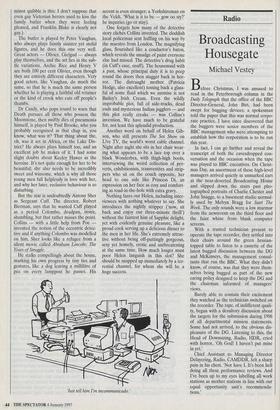Television
What a
gem
Simon Hoggart After the problems costume dramas have had lately — too chintzy, all those perfect ball-gowns freshly ironed every day, the anachronistic dialogue (`Leave it out, Lady Carfax') — it's good to see the BBC get it absolutely right with The Moonstone.
To be frank, the adaptation of Wilkie Collins's novel started badly, with a dream sequence in which the eponymous gem was snatched by an evil imperialist British offi- cer from defenceless Indian priests. The fight had the air of being part of the Little Titchmarsh Players' production of The Siege of Seringapatam, and the god's statue had clearly been run up by whatever bureaucratic pen-pusher has now replaced the people who made props in the BBC Properties Department.
But after that the whole production was a joy. The whole thing walked the fine line between realism and satire, between a straight mystery and a first-rate pastiche. It was Agatha Christie with real people, The Remains of the Day with a sense of humour.
Most of the credit must go to the screen- play writer, Kevin Elyot. I have to confess interest here. Kevin Elyot, then trading under a different name, was a schoolfriend of my brother's and used to come to our house. Thus I knew him before he was Kevin Elyot, and indeed before he was gay. He went on to write the highly successful gay play My Night With Reg. (Another minor quibble is this: I don't suppose that even gay Victorian heroes used to kiss the family butler when they were feeling pleased, and Franklin Blake is clearly not gay.) The butler is played by Peter Vaughan, who always plays faintly sinister yet stolid figures, and he does this one very well. Great actors — Olivier, Gielgud — always play themselves, and the art lies in the sub- tle variations. Archie Rice and Henry V are both 100 per cent Olivier, even though they are entirely different characters. Very good actors, like Vaughan, do much the same, so that he is much the same person whether he is playing a faithful old retainer or the kind of crook who cuts off people's thumbs.
Dr Candy, who pops round to warn that Death pursues all those who possess the Moonstone, then swiftly dies of pneumonia himself, is played by Paul Brooke, who you probably recognised as that chap in, you know, what was it? That thing about the, oh, was it set in Africa, or the Lake Dis- trict? He always plays himself too, and an excellent job he makes of it. I had some slight doubts about Keeley Hawes as the heroine. It's not quite enough for her to be beautiful; she also needs to be incredibly sweet and winsome, which is why all those young men fall helplessly in love with her, and why her later, reclusive behaviour is so disturbing.
But the star is undoubtedly Antony Sher as Sergeant Cuff. The director, Robert Bierman, says that he wanted Cuff played as a period Colombo, deadpan, ironic, shambling, but that rather misses the point. Collins — with a little help from Poe invented the notion of the eccentric detec- tive and if anything Colombo was modelled on him. Sher looks like a refugee from a silent movie called Abraham Lincoln: The Years of Struggle.
He stalks compellingly about the house, marking his own progress by tiny tics and gestures, like a dog leaving a millilitre of pee on every lamppost he passes. His accent is even stranger; a Yorkshireman on the Veldt. 'What is it to be — gow oo sty?' he inquiries (go or stay).
One forgets how many of the detective story clichés Collins invented. The cloddish local policeman sent huffing on his way by the maestro from London. The magnifying glass, flourished like a conductor's baton, which reveals the smudge of paint everyone else had missed. The detective's drug habit (in Cuffs case, snuff). The housemaid with a past, whose principal duty it is to peep round the doors then stagger back in hor- ror. The distraught mother (Patricia Hodge, also excellent) tossing back a glass- ful of some fluid which we surmise is not Bailey's Irish Cream. Even the wildly improbable plot, full of side-tracks, dead ends and mysterious Indian jugglers — and this plot really creaks — was Collins's invention. We have much to be grateful for, not least this splendid production.
Another word on behalf of Helen Gib- son, who still presents The Sex Show on L!ve TV, the world's worst cable channel. Night after night she sits in her chair wear- ing what appears to be a lace top over a black Wonderbra, with thigh-high boots, interviewing the weird collection of per- verts, exhibitionists, transvestites and strip- pers who sit on the couch opposite, her head to one side like Princess Di, an expression on her face as cosy and comfort- ing as toad-in-the-hole with extra gravy.
Nothing fazes our Helen, including inter- viewees with nothing whatever to say. She introduces the nightly stripper (`now, sit back and enjoy our three-minute thrill') without the faintest hint of Sapphic delight, yet with evidently genuine pleasure, like a proud cook serving up a delicious dinner to the men in her life. She's extremely attrac- tive without being off-puttingly gorgeous, sexy yet homely, erotic and unthreatening at the same time. How much longer must poor Helen languish in this slot? She should be snapped up immediately by a ter- restial channel, for whom she will be a huge success.
Just tell him I'm incommunicado.'



























































 Previous page
Previous page